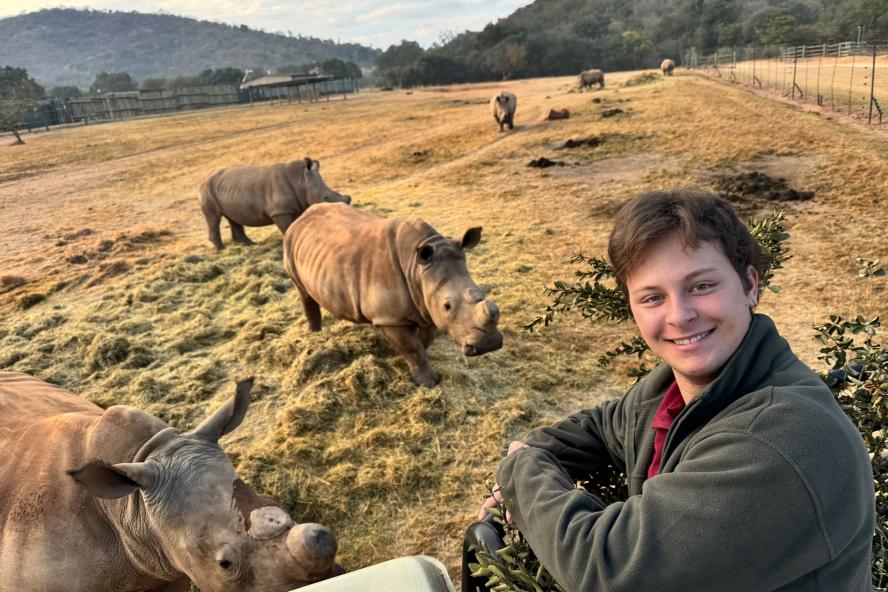Instructor Spotlight: Kai Preminger

Tell us about yourself and what inspired you to teach this course
From a very young age, I loved going to the zoo. Something about the huge exotic animals taught me to appreciate the world around me. Through this lens I was able to grow and appreciate the smaller creatures that often go underrepresented in zoos—and with that came the ability to critique zoos as imperfect institutions. I’m a pre-vet student, and seriously considering going into wildlife or zoo medicine as a career. I also spent a portion of this past summer in South Africa working at a zoo and a rhino sanctuary. Both of these experiences completely changed the way I look at animal-based institutions, reinvigorating my passion for the topic and preparing me to share the knowledge I gained with my students. I took an ExCollege class my freshman year (The Explorations course, Governments in Dystopian Film and Fiction) and knew I wanted to teach a class one day. When thinking of a topic, this seemed like the perfect option.
Could you tell us about the history of zoos?
It’s long and complex, but I’ll do my best to condense it. Archeologists discovered evidence of an early zoo in Hierakonpolis, a city in Ancient Egypt. It’s far different from the zoos of the 21st century, but the concept of keeping exotic animals in enclosures remains the same today. Fun fact: the modern zoo was preceded by botanical gardens, which were actually seen as controversial. They were opposed by the Catholic church for promoting the earthly and the sensual, and then later celebrated as representations of the Garden of Eden. These were early examples of humanity dominating over nature. Zoos became more and more prominent in the 18th century, during the Age of Enlightenment, but a century later animal-liberation movements began taking hold. The modern zoo took shape from there and led to what we have today: zoos focused on conservation, education, and (hopefully) animal welfare.
Where does the concept of zoo reform come from?
Zoos have been evolving from the beginning, but it’s really only the last several decades that people have taken a serious look at making systemic change. Zoos accredited by the Association for Zoos & Aquariums (AZA) have to go through the accreditation process every five years, with guidelines and regulations about animal care and management updated regularly. Therefore, accredited zoos are forced to keep up with modern ideas of what zoos should be. There are more drastic approaches to zoo reform that involve reworking the entire structure of the institutions; some suggest removing exotic megafauna and focusing on local animals, while some offer the idea that zoos should be replaced with large wildlife sanctuaries only available to the public through virtual tours. Whatever the solution is, zoos are being analyzed more critically now than ever before.
For the zoo fans out there, what is one way you can interact with zoos in an ethical way?
This is really subjective. It depends on what people view as ethical! There is such an active, exciting debate on the morality of zoos, and whether or not they bring more harm than benefit to animals and the public. My biggest advice would be to research the institution before you go! Avoid theme-park type institutions that put profit and entertainment over animal welfare, and focus on bioparks, wildlife centers, and AZA-accredited zoos. Zoos aren’t going anywhere anytime soon, but there are ways to advocate for their improvement. If you see an issue at a zoo, speak up. But remember, some things that seem problematic might actually benefit the animals. For instance, many zoos overfeed animals to avoid public complaints about them looking too thin/malnourished. So, to emphasize, do your research!
What do you hope that students will take away from your course?
My ultimate goal is that students will look at their relationship with animals differently, and that they’ll learn to notice and appreciate all the living things around them. We talk a lot in my class about the animal hierarchy, how we idolize the cute, exotic, and fluffy megafauna while often ignoring the smaller invertebrates and local species. With this in mind, I hope students gain the ability to analyze zoos critically and to pinpoint ways to make them better. This critical thinking skill is essential and can be applied to any institution they interact with, encouraging them to question, analyze, and advocate for positive change in all areas of their lives.
What is something that has happened in your course that you are excited about?
So many things!! We learned about enrichment in zoos a couple of weeks ago, and the students built clay models of objects of their own design that would enrich a specific species. I’m also super excited for the final assignment: a comprehensive zoo design project that gives my students the chance to apply everything they’ve learned in the course. They’ll be tasked with creating an “ethical” zoo and how they interpret that is up to them! They’ll design enclosures, decide which animals to feature, write up a mission statement for their zoo, including all the logistical details that make a zoo possible. We’re also going to the Franklin Park Zoo later in the semester which will help to connect ideas to real-world scenarios.
Kai Preminger (he/him) is a biology major from Los Angeles, CA. He is co-president of the Tufts Pre-Veterinary Society and the VP of Club Pickleball. In his spare time, he bikes and works as a dog walker.